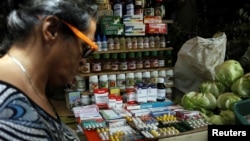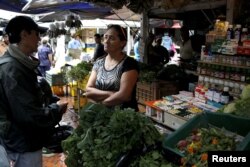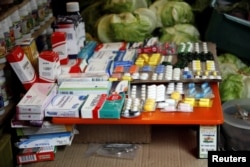Venezuela's critical medicine shortage has spurred "medical flea markets," where peddlers offer everything from antibiotics to contraceptives laid out among the traditional fruits and vegetables.
The crisis-wrought Latin American nation is heaving under worsening scarcity of drugs, as well as basic foods, due to tanking national production and strict currency controls that crimp imports.
The local pharmaceutical association estimates at any given time, there is a shortage of around 85 percent of drugs.
Sick Venezuelans often scour pharmacies and send pleas on social media to find treatment. Increasingly, however, they are turning to a flourishing black market offering medicines surreptitiously bought from Venezuelan hospitals or smuggled in from neighboring Colombia.
"Here I can find the vitamins I need for my memory," said 56-year-old Marisol Salas, who suffered a stroke, as she bought the pills at a small stand at the main bus terminal in the Andean city of San Cristobal.
Around her, Venezuelans asked sellers for medicine to control blood pressure as well as birth control pills.
"People are looking for anticonvulsants a lot recently," said Antuam Lopez, 30, who sells medicine alongside vegetables, and said hospital employees usually provide him with the drugs.
Leftist President Nicolas Maduro says resellers are in league with a U.S.-led conspiracy to sabotage socialism and are to blame for medicine shortages.
Risks
In the middle of a market in the humid and sweltering city of Maracaibo, dozens of boxes full of medicines including antibiotics and pain killers are stacked on top of each other.
The packaging is visibly deteriorated: The cases are discolored and some are even dirty.
Doctors warn these drugs —- usually smuggled in from Colombia, a few hours' drive from Maracaibo —- pose risks.
"We've found that a lot of them have not been maintained at proper temperatures," warned oncologist Jose Oberto, who leads the Zulia state's doctors association.
Still, some Venezuelans feel they have no choice but to rely on contraband medicine.
"I had to buy medicine from Colombia, and it worried me because the label said 'hospital use,'" said retiree Esledy Paez, 62.
But they are often prohibitively expensive for Venezuelans, many of whom earn just a handful of dollars a month at the black market rate due to soaring inflation.
Norkis Pabon struggled to find antibiotics for her hospitalized husband to prevent his foot injury from worsening due to diabetes.
"But the treatment costs 900,000 bolivars ($9.43; twice the minimum wage) and I do not know what to do," said Pabon, who is unemployed.







